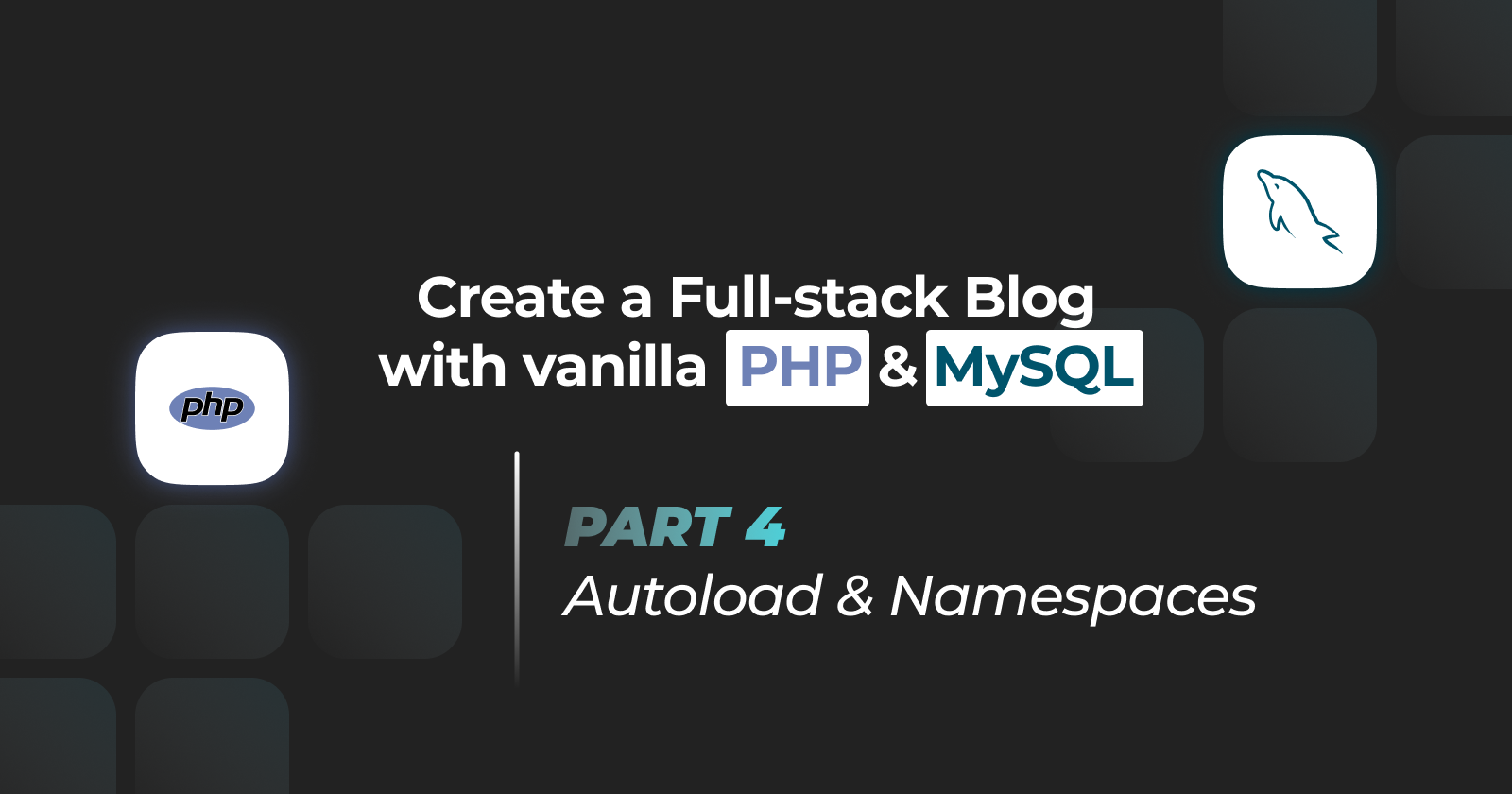Vanilla Blog — Part 4 | Autoload & Namespace
 Mehdi Jai
Mehdi Jai
Other Parts:
In PHP development, managing large projects with numerous classes and files can become challenging. However, two powerful features, autoload and namespaces, come to the rescue. Autoload simplifies the inclusion of class files, while namespaces organize and avoid naming conflicts. This article will delve into autoload and namespaces, exploring their benefits and providing practical examples.
Autoload:
In PHP, including class files manually using the require or include statements that can become cumbersome as the project grows. Autoload offers an automated approach by loading classes only when needed, improving efficiency and reducing developer effort.
Autoloading classes can be achieved using the spl_autoload_register() function, which allows registering multiple autoload functions. Here's an example:
spl_autoload_register(function ($class) {
require base_path(str_replace('\\', DIRECTORY_SEPARATOR, $class) . '.php');
});
In the above code, the autoload function is defined using an anonymous function. It converts the namespace separator \ to the directory separator / and appends the .php extension to locate the class file. If the file exists, it is required or included.
With autoload, you can simply instantiate a class without explicitly including its file:
$obj = new MyNamespace\MyClass();
The autoload function takes care of loading the MyClass file when necessary.
Namespaces:
Namespaces are essential for organizing and structuring code in PHP projects. They provide a way to avoid naming conflicts, especially when working with third-party libraries or modules. Namespaces allow for logical separation and ensure clarity and maintainability in larger projects.
To define a namespace, you use the namespace keyword followed by the namespace name. Here's an example:
namespace MyNamespace;
class MyClass {
// Class code
}
In the example, the MyClass class is declared within the MyNamespace. Namespaces allow you to differentiate between classes with the same name but residing in different namespaces.
To use a class from a specific namespace, you can utilize either the fully qualified name or import the namespace using the use statement. Here's an example of importing a namespace:
use MyNamespace\MyClass;
$obj = new MyClass();
By importing the namespace with the use statement, you can directly reference the MyClass without specifying the namespace each time.
Update The project:
// public/index.php
...
require BASE_PATH . "app/functions/utils.php";
spl_autoload_register(function ($class) {
require base_path(str_replace('\\', DIRECTORY_SEPARATOR, $class) . '.php');
});
// Remove: require base_path("app/Core/Router.php");
require base_path("routes/web.php");
<?php
// routes/web.php
namespace Routes;
use App\Core\Router;
use App\Controllers\HomeController;
use App\Controllers\PostController;
use App\Controllers\AboutController;
use App\Controllers\ContactController;
$router = Router::getInstance();
// AboutController::class we return the Namespace/Class string
$router->get("/about", AboutController::class);
$router->get("/", HomeController::class);
$router->get("/contact", ContactController::class);
$router->post("/contact", ContactController::class, "send");
$router->get("/post/{slug}", HomeController::class, "post");
$router->route();
// app/Core/Router.php
namespace App\Core;
...
Controllers
Create a new class named Controller. It will be extended by all the controllers.
// app/controllers/Controller.php
<?php
namespace App\Controllers;
class Controller
{
protected $data = [];
public function __construct(array $data)
{
$this->data = $data;
}
}
Now, you can remove the variable $data declaration, and the constructor:
<?php
// app/controllers/HomeController.php
namespace App\Controllers;
// Extend Controller Class
class HomeController extends Controller
{
...
}
Conclusion:
Autoload and namespaces are powerful features in PHP that greatly enhance the development process. Autoload simplifies the inclusion of class files, making it easier to manage large projects. Namespaces provide a mechanism for organizing code, avoiding naming conflicts and improving code readability. By harnessing these features effectively, PHP developers can build scalable and maintainable applications with ease.
see you at the next one!
Subscribe to my newsletter
Read articles from Mehdi Jai directly inside your inbox. Subscribe to the newsletter, and don't miss out.
Written by

Mehdi Jai
Mehdi Jai
Result-oriented Lead Full-Stack Web Developer & UI/UX designer with 5+ years of experience in designing, developing and deploying web applications.